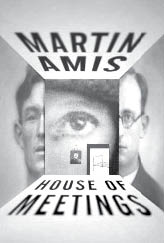House of Meetings, by Martin Amis
by Laura Nathan

If Martin Amis’ newest novel, House of Meetings, is any indication, the confessional letter still has literary merit. Written to the unnamed narrator’s so-called stepdaughter, Venus, House of Meetings reminds us of one of the letter’s purposes: to convey the “truth,” or at least those aspects of ourselves we are incapable of articulating face-to-face, over the phone, or even via e-mail, when the possibility of an immediate response leaves our stomachs in knots.
Amis’ use of the letter is powerful precisely because the narrator is a reflective, self-critical (though understandably neurotic and sometimes insecure) 84-year-old man writing to a daughter, whom—we gather—is both a beauty and a feminist, one who would disapprove of her father’s past as a womanizer and rapist. Bridging the gap between Soviet and American cultures, past and present, old world and new, the narrator, we are assured, is not the kind of rapist you’d hear about on the 11 o’clock news. He is instead a survivor of the Soviet Union’s gulags, where rape became the norm, as did the narrator’s affair with Zoya, a promiscuous woman whom the narrator’s half-brother, Lev, later married without the narrator’s knowledge.
In this well-researched novel where past and present, East and West, collide poignantly like Lev and the narrator, Amis enables—seduces—us to imagine a past so oppressive that the narrator cannot even refer to Stalin by name. In doing so, the British author—who insists he’s never visited Russia— dupes us into believing we’re reading Eastern Europe’s native sons: Dostoyevsky, Nabokov and, at times, Isaac Bashevis Singer. Now that’s something to write home about.
|
Issue Navigation> Issue Index > v6n3: No Deal on the Buffalo Casino (1/18/07) > Book Reviews > House of Meetings, by Martin Amis This Week's Issue • Artvoice Daily • Artvoice TV • Events Calendar • Classifieds |









 Current Issue
Current Issue